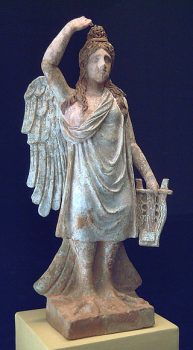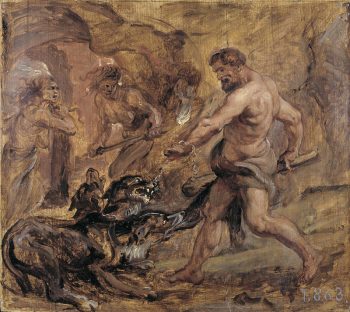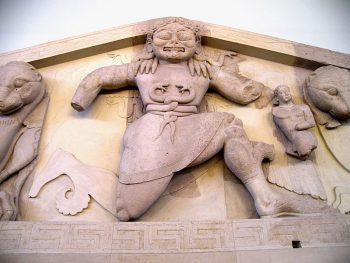Sirens and Other Mythological Beasts Posted by andregurgel on Mar 11, 2019 in Intro to Latin Course, Roman culture
Note: This blog post is a companion to Unit IV of our Introduction to Latin Vocabulary course. You can learn more about the course here.
Most people today think that mythology is an uninteresting subject, created by people who lived thousands of years ago. Well, the ancients certainly didn’t think so! Back then, myths and legends were the way they found to explain the world around them and they took it very seriously. Greeks, Romans and other peoples didn’t know how to explain thunder so they would say that Zeus was striking with his thunderbolts. When a volcanic eruption occurred, what was that but the god Vulcan who had just learned about another of his wife’s affairs? But mythology was also used to explain more complex questions such as the creation of the world.
The Sirens: Watch out, Sailors!
The word ‘siren’ in Greek doesn’t have a clear etymology. It may sound weird, but some ancient Greek words might not be ancient Greek at all. Sirens were mythical creatures who used their melodious voices to attract sailors and drown them. In Homer’s great work ‘the Odyssey’, which narrates the deeds of the Greek hero Odysseus, we hear about only two sirens. Other less well-known sources, such as the Roman writer Hyginus, mention four. According to Hyginus, these were originally the lady servants of Persephone, daughter of the goddess Demeter. When Persephone was kidnapped by Hades, the god of death, her servants asked the gods to give them wings so they could search for her high and low. However, Demeter became angry with them for allowing her daughter to be kidnapped and turned them into winged monsters.
There are several ancient stories about heroes escaping the magical singing spell of the sirens, but it’s hard to find a tale as fascinating as Odysseus’ stratagem. He ordered his ship’s crew to fill their ears with beeswax while they were sailing past the siren’s island, but that wasn’t enough for Odysseus, king of Ithaka. He was curious by nature and wanted to hear their fateful song, so he ordered his men to tie him to the ship’s mast. When he eventually heard the singing he begged his men to release him, but luckily they refused.
It may sound funny but up until a few centuries ago, people still believed that the ocean harbored sirens and other sea monsters like Scylla and Charybdis (hence the English idiom “between Scylla and Charybdis”). Sailors were (and still are) one superstitious lot! That’s why there are legends about similar beasts in other cultures. The German tradition has a water spirit called Lorelei which inspired a beautiful German ballad of the same name. Slavic mythology has the Rusalka, which was the inspiration for Dvorak’s opera of the same name. Last but not least, Brazilian indigenous people believed in a water spirit called Iara, surprisingly similar to the Greek one.
Cerberus: Don’t mess with him! (unless you’re Hercules)
You have probably heard people say that dogs are a man’s best friend and have been so for millennia. That’s why they are a common mythological motif. Sometimes they are evil like the Scottish folkloric creature ‘cu sith’ (fairy dog in Scottish Gaelic), an omen of death for the people of the Highlands. They can also be benign creatures like the Hindu dog goddess Sarama. The Greeks were no exception and, according to their beliefs, the gates of Hell were guarded by a huge three-headed dog named Cerberus.
The monster Cerberus was the offspring of the ancient beasts Typhon and Echidna who were also the parents of many other monsters. Cerberus would frighten any of us. He had three heads and a serpent’s tail, but Hades, god of the underworld, thought the dog was cute and adopted him as his pet. I know, gods have a weird taste for pets, but de gustibus non est disputandum (there is no accounting for taste).
There are many legends about heroes who went to the underworld and had to face Cerberus. Heracles was ordered to bring the hound of Hades back alive to Eurystheus. Odysseus and Aeneas also had to go past the monster and, last but not least, the beast shows up in the sixth canto of Dante’s Divine Comedy. However, the most inspiring legend is when Orpheus went to the underworld to convince Hades to bring his wife Eurydice back to life. Cerberus blocked his way, and what do you think Orpheus did? Threw him a bone? Not really! He played a beautiful song on his harp and made Cerberus fall asleep! There is strong symbolism here about the power of music which is able to calm down even the most dreadful monster. This ancient myth was a source of inspiration for “Harry Potter and the Philosopher’s Stone”, by best-selling author J. K. Rowling, but the monster is called Fluffy rather than Cerberus!
The Gorgons
The word ‘Gorgon’ comes from ancient Greek and means “terrible” or “dreadful”. The Gorgons were three monsters with serpent hair, boar fangs, bronze hands and golden wings who turned people into stone. Two of them, Stheno and Euryale, were immortal, but their sister, Medusa, was killed by the hero Perseus.
The hero Perseus was living at the court of king Polydectes. The king had fallen in love with Perseus’ mother Danae and, in order to get rid of him, he charged Perseus with the killing of Medusa. Polydectes knew that that was an impossible task and thought that the son of Danae would die. However, that wasn’t so!
Perseus received magical items to achieve this task: Zeus gave him a sword, Hermes gave him winged shoes, Athena gave him a shield, and Hades provided him with a cloak to turn him invisible. He had enough weapons but he didn’t know how to find the Gorgons. No GPS back then! The only ones who knew the exact location were the Graeae, three elderly sisters who shared one eye. The Greek hero captured their common eye and promised to give it back as long as the Graeae told him how to find the Gorgons.
When the hero found the three Gorgons, they weren’t aware of his presence, as he was wearing Hades’ invisible cloak. He used Athena’s shield to see Medusa’s reflection and used Zeus’ sword to cut her head off. Perseus used Medusa’s head for a while to literally petrify his enemies. Then he gave it to Athena who placed it on her shield. After all, it’s only fair. Perseus wouldn’t have made it if it weren’t for her help!
Is mythology useless? Absolutely not! If we study it and understand the minds of our ancestors, we see a whole brave new world before us. In the 19th century, a German boy heard his father tell the tale of the fall of Troy. Years later, this boy became the famous archaeologist Heinrich Schliemann who located the ruins of a city which may be the same city described in Homer’s work! Would you like to be the next Schliemann? Then don’t dismiss the truths hidden in myths and legends!
Is mythology dead? It certainly isn’t! But today we call it urban legends! You have probably heard about ‘the vanishing hitchhiker’ and ‘the black dog’, for example. That shows how the Greek spirit still lives in all of us and mythology will never die!
Glossary of Latin Terms
de gustibus non est disputandum– there is no accounting for taste
References
The Odyssey. Homer. Loeb Classical Library. Translated by A.T.Murray.
The Library of Greek Mythology. Pseudoapollodorus. Independently published
Gods and Heroes of Ancient Greece. Schwabb, Gustav. Published by Pantheon.

Build vocabulary, practice pronunciation, and more with Transparent Language Online. Available anytime, anywhere, on any device.






